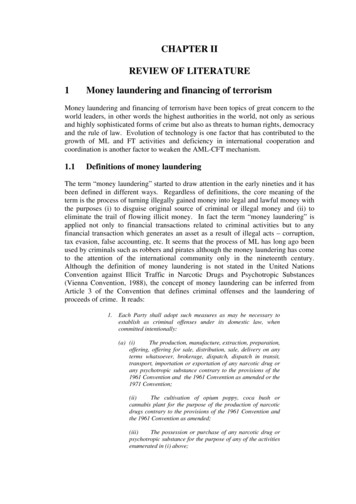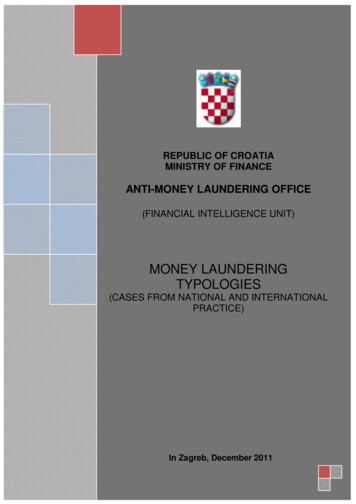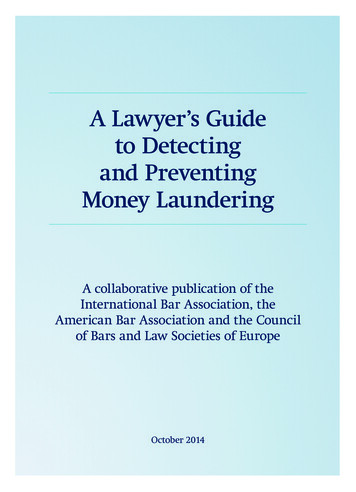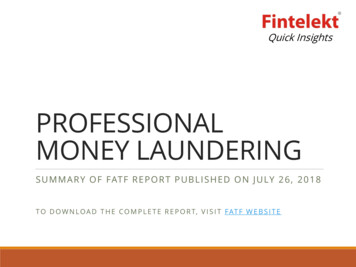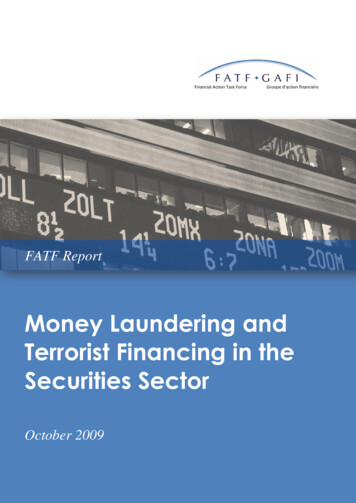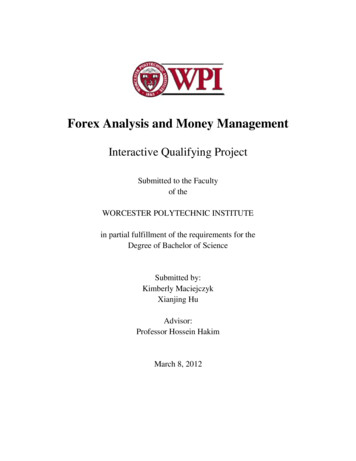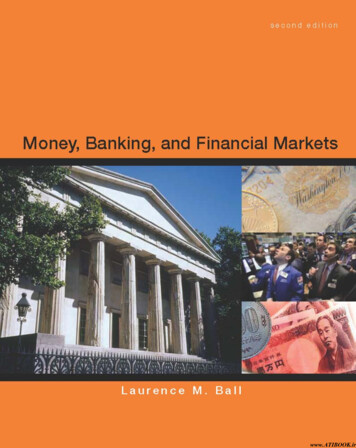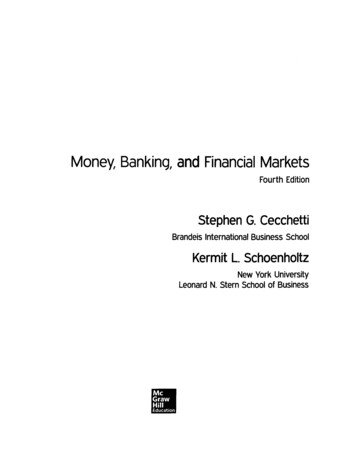
Transcription
THE 21 SMARTEST MONEY MOVES TO MAKE IN 2021M O N E Y. C O M1
The 21 Smartest Money Moves to Make in 2021POP THE CHAMPAGNE(in a safe, outdoor setting)because 2021 is finally here.Even in a pandemic, a newyear is an opportunity for afresh start. Vaccines arecoming, the economy isslowly returning to normal,and you’re perfectly poised toimprove your financial life.And Money is here to help.We’ve compiled a list of the21 smartest money movesyou can make in 2021. Fixyour budget, maximize yoursavings, spice up yourresume and more with ourguide. While these aren’tnecessarily easy, we lookedfor things that couldrealistically be accomplishedwith a few hours (or in somecases days) of effort.See how many you cancomplete!FINANCIAL DISCLAIMERTHE PURPOSE OF THIS TOOLKIT IS TO EDUCATE AND INFORM,AND SHOULD NOT BE CONSTRUED AS FINANCIAL, LEGAL, TAX,INVESTMENT, OR OTHER ADVICE. EACH CASE IS DIFFERENT.THEREFORE, WE ENCOURAGE YOU TO CONTACT A QUALIFIEDPROFESSIONAL TO ENSURE YOU ARE MAKING THE RIGHTDECISIONS TO ACHIEVE YOUR FINANCIAL GOALS. FOR MOREDETAILS, PLEASE READ OUR FULL DISCLAIMER.ADVERTISER DISCLOSURETHIS TOOLKIT IS FREE BECAUSE MONEY EARNS ACOMMISSION WHEN YOU CLICK OR MAKE PURCHASES FROMTHE LINKS IN THIS PDF AND ON MONEY.COM. OFFERS MAY BESUBJECT TO CHANGE WITHOUT NOTICE. LEARN MORE ABOUTHOW WE MAKE MONEY.Finance Your Future1. Get Serious About Saving2. Actually Earn Something on Your Cash3. Reconsider Small Caps4. Invest Your Conscience with an ESG Fund5. Add a New Line to Your Resumé6. Max Out Your 401(k)Get Financially Fit7. Let Netflix Help Build Your Credit8. Share Driving Data with Your Insurer9. Keep Uncle Sam Out of Your Paycheck10. Don’t Take Your First Financial Aid Offer11. Protect Yourself from Fraud12. Don’t Delay on Life InsuranceLeverage Your Assets1 3. Lean on Your Landlord and Ask fora Rent Break1 4. Refinance Your Mortgage to Reapthe Record Lows 15. Sell Your Home Site Unseen 16. Get a Great Deal on Your Next CarSpend Smarter 17. Earn Credit Card Rewards on Your Groceries 18. Get a Great TV Without Overspending 19. Streamline Your Streaming 0. Save Money and the Environment with a2Smart Power Strip 21. Get Ready to See the World Again and StartResearching Your 2021 TravelM O N E Y. C O M2
Finance Your Future1. GET SERIOUS ABOUT SAVINGIf Americans ever doubted the importance of saving, the coronavirus pandemic has made it clearjust how necessary a financial cushion can be. A study from the Pew Research Center found that41% of all adults in the U.S. have had trouble paying their bills and making housing payments sincethe pandemic began, while a study from Clever found that 61% of Americans said they don’t expectto have any emergency savings by the end of 2020. That’s why in 2021, it’s time to get serious aboutsaving — even if you think you’re already in a comfortable financial position.Financial advisors often encourage people to follow a 50-30-20 rule when dividing up their takehome pay, with 50% of your income going towards living expenses like rent and groceries, 30% forrecreation or entertainment, and 20% going into savings. But for people who are just starting tosave (or even those who are already on the right track), jumping from zero to 20 can be a dauntingtask — and sometimes downright impossible. That’s why it helps to set incremental goals,according to Kristen Euretig, a certified financial planner and founder of Brooklyn Plans.THE 21 SMARTEST MONEY MOVES TO MAKE IN 2021M O N E Y. C O M3
She recommends starting with a number you can actually commit to, even if it’s just a few dollarsand gradually adding more as you get comfortable. For example, start by saving 5% of yourmonthly income in January and then increase that amount by one percentage point each month.By December you’ll have tripled the money going towards an emergency fund each month. “Savingis a long game, and it’s a situation where the tortoise wins every time,” says Euretig.2. ACTUALLY EARN SOMETHING ON YOUR CASHOne additional obstacle savers face right now: Low interest rates make it hard to earn much, evenin CDs and so-called high-yield saving accounts offered online. The good news is there are betteroptions if you are willing to put in a little extra legwork.One good place to look is high-yield checking accounts (also known as rewards checking accounts),according to Ken Tumin, founder of DepositAccounts.com. Some of these pay as high as 4%(compared to less than 1% for most CDs). Of course these accounts, mostly offered through creditunions and regional banks, do have some caveats, typically requiring a certain number ofelectronic transactions per month and limiting the amounts on which they will pay out top dollar.For example, Consumers Credit Union’s Reward Checking account offers up to 4.09% interest on 10,000 or less, although there are some hefty stipulations. To earn the full amount, members needto make at least 12 monthly debit card purchases and deposit 500 each month. To earn themaximum interest, members also need to spend 1,000 each month using a CCU Visa credit card.However, account holders can opt out of the credit card and still get a comfortable 2.09% APY.3. RECONSIDER SMALL CAPSIt’s been hard out there for shares of so-called small-cap companies, those with market valuesbelow 2 billion or so. While tech giants like Apple and Amazon have seen business actuallyimprove during the pandemic, smaller companies, whose financial prospects tend to be tied closelyto the overall health of the U.S. economy, have struggled mightily: While large-cap stocks havereturned 14% over the past three years, small cap core stocks have returned just 8.7%.The silver lining: Historically, once the economy begins to pull out of a recession, investors tend towarm to small caps and their returns can sling-shot ahead of those of bigger, steadier names.Looking at the past 11 recessions small-cap stocks beat larger ones by more than six percentagepoints on average, in the six months immediately after the recession ended, according to brokeragefirm LPL.While the U.S. economy isn’t out of the woods yet, the prospect of an effective COVID vaccine hasTHE 21 SMARTEST MONEY MOVES TO MAKE IN 2021M O N E Y. C O M4
many Wall Street analysts hoping small stocks could turn the corner in 2021. “Small caps may havehistory on their side,” wrote Invesco portfolio managers Matthew Ziehl, Adam Weiner and JasonFarrell in a recent blog post.4. INVEST YOUR CONSCIENCE WITH AN ESG FUNDWith issues like racial justice and climate change on young investors’ minds, so-called ESG (orenvironmental, social and governance) funds have been gaining fans. By the end of September, U.S.sustainable funds attracted a record 31 billion in new investment dollars, according toMorningstar. The strategy is also getting the attention of some of the biggest names on Wall Street.In its annual letter to clients, BlackRock said the company was making sustainability integral tothe way it manages risk and constructs portfolios.As an investor, it’s nice to think that you can easily sort “good” companies from “bad” ones. Butthat’s not always the case. “There are some notable shortcomings that the industry still has to ironout,” says Jennifer Coombs, associate professor at the College for Financial Planning specializing inESG investing. Among these concerns is that the handful of agencies that grade companies on theiradherence to ESG principles tend to vary widely in their approaches.Still, resources like Morningstar are making ESG investing easier with tools like the ESG Screener,which allows investors to search for mutual funds with a particular sustainable investing mission,helping you to find funds that exclude, say, tobacco companies or those that make guns.5. ADD A NEW LINE TO YOUR RESUMÉWe’re spending an awful lot of time indoors these days, and it’s sparking something of an onlinelearning renaissance. So-called MOOCs (massive open online courses) saw their user ranksexplode within the first few months of lockdowns. These online courses “have been learning whatworks for years,” says Julia Lamm, workforce consulting partner at PwC. “That gives them a reallyinteresting advantage.”Blanket pass/fail grading systems have been replaced by real feedback from real professors.Meanwhile, fast-track certifications, specializations, and “MicroMasters” programs are offered at afraction of the cost of in-person tuition. And while programming classes and coding “bootcamps”still lead the pack in terms of volume (the demand for tech talent isn’t going away anytime soon,Lamm says), new, non-tech offerings are quickly gaining traction. Now you can get an onlinecertification in an area like child development, Facebook social media management, nutrition, orpet grooming. And that’s just the tip of the iceberg.THE 21 SMARTEST MONEY MOVES TO MAKE IN 2021M O N E Y. C O M5
Some skills are more lucrative than others. (As Money has previously reported learning certainprogramming languages can give you a near-immediate 20% salary boost). But even if an onlinepublic speaking class isn’t a golden ticket to a six-figure salary, it is a useful bargaining chip foryour next salary negotiation. “If someone has gone the extra mile to acquire a skill, [a hiringmanager] will see that as a huge positive,” Lamm says.6. MAX OUT YOUR 401(K)Super savers got some bad news this fall, when the IRS announced that contribution limits forretirement accounts would remain unchanged for 2021. Workers under 50 can contribute 19,500to their 401(k) and 6,000 to their IRA; those 50 and over can contribute an additional 6,500 in“catch-up” funds to their workplace account and 1,000 to their individual account — the same asin 2020.Most workers aren’t maxing out their retirement contributions anyway, so they’re not going tonotice that the IRS skipped an inflation bump. The average participant contributed 7% of pay totheir 401(k) in 2019, according to Vanguard. (The brokerage doesn’t track the average contributionby dollar amount.)Many plans allow you to set your contribution to increase automatically at a time of your choosing— whether that’s at the beginning of each new year, or whenever you get a raise. It’s one of theeasiest moves you can make to improve your financial future, and you probably won’t even missthat money in your paycheck. At the very least, you should contribute enough to your 401(k) to getyour employer match, if you have one. Vanguard recommends saving between 12% and 15% of yourpay, including the match.THE 21 SMARTEST MONEY MOVES TO MAKE IN 2021M O N E Y. C O M6
Get Financially Fit7. LET NETFLIX HELP BUILD YOUR CREDITWhen it comes to your credit score, you need every point you can get — so consider signing up foran account with Experian Boost. Launched in 2019, it’s a free tool that uses your on-time billpayments for utilities to increase your FICO score. And this year, it expanded to include streamingservices like Netflix, Hulu, and Disney .Credit scores, which are essential to getting approved for a mortgage or auto loan, are based on avariety of factors, but a lengthy history of paying bills on time is key. This has historically putyoung people, as well as those who prefer to use cash, at a disadvantage. Experian Boost attemptsto bridge that gap, by including more payments to prove you are a worthy borrower, says RodGriffin, senior director of consumer education and advocacy for Experian.Experian Boost only affects your Experian file, not your credit reports with Equifax or TransUnion,but it’s still pretty popular: More than 4 million people have connected their accounts so far. Griffinsays it should only take about five minutes to set up, and you’ll spot the difference immediately.Find additional tips on how to boost your credit score fast here.THE 21 SMARTEST MONEY MOVES TO MAKE IN 2021M O N E Y. C O M7
8. SHARE DRIVING DATA WITH YOUR INSURERWith millions of Americans working from home, we’re driving a lot less than we have in the past.Insurance companies compensated customers with rebates last spring, but these didn’t amount tomuch. The good news is, technology is rapidly making it easier for infrequent drivers to save — solong as you are willing to let the insurance company monitor your driving.Through what’s known as telematics, you can opt to have your driving tracked by either on-boardtechnology or an app on your smartphone. The data you share will likely include not only how faryou go but how well you drive, including how aggressively you accelerate, brake, and corner. Thisdata allows the insurer to tailor your premiums to your driving.Long-term savings are far from guaranteed. But a number of insurers offer 5% to 10% discounts fortrying their telematics programs, and predict ongoing savings of 15% to 40% over a traditionalpolicy for those who drive the least and most safely. You must, of course, be comfortable having theinsurer continually monitoring how and how far you drive. The programs do, though, also providefeedback on your driving, which insurers say can help you drive more safely.9. KEEP UNCLE SAM OUT OF YOUR PAYCHECKGetting a huge tax refund every spring might be fun, but it’s not actually advisable. According tothe IRS, roughly three-quarters of taxpayers are guilty of over-withholding, meaning they’veinstructed their employers to take out too much from each paycheck to cover income taxes. As aresult, their take-home pay throughout the year is less than it should be. Someone getting theaverage refund of 2,535 is missing out on 211 a month.Don’t give Uncle Sam an interest-free loan, especially during a recession. Mike Savage, chiefexecutive of virtual accounting firm 1-800Accountant, says you can fill out a new Form W-4 andsubmit it to your employer in order to adjust your withholding.The paperwork might look a little different than you’re used to: The IRS overhauled Form W-4 in2020 in an effort to increase “the transparency and accuracy of the withholding system.” Thecomplicated allowances worksheet has been replaced with a series of five steps, making it easier tosee whether you’re withholding the correct amount from your pay.If you need extra help, you can also use the agency’s recently revamped Tax Withholding Estimatortool, which will ask questions about your filing status, dependents, wages, pension, other incomeand demographics. The IRS especially recommends people who had a major life change — like ababy, marriage or divorce — “or were adversely affected by the pandemic” do a checkup. TheTHE 21 SMARTEST MONEY MOVES TO MAKE IN 2021M O N E Y. C O M8
American Institute of CPAs also suggests you review your state withholding if you started workingremotely elsewhere due to the coronavirus crisis.10. DON’T TAKE YOUR FIRST FINANCIAL AID OFFERMany families are still dealing with financial strains brought on by the pandemic, which means youmay be eligible for additional need-based financial aid. Six out of 10 colleges reported an increase inthe number of students asking for more financial aid in 2020, and there’s no reason to expect suchappeals to slow in 2021. One thing in your favor: Right now plenty of colleges are struggling toenroll students, which means they may be more willing to offer higher discounts or merit-basedscholarships.Just over a quarter of families in a September survey from Sallie Mae said they appealed theirfinancial aid offers ahead of the fall 2020 semester. But 66% of those who did received more helpfrom their college, including 50% who said they received more in grants or scholarships.Whether you’ll get more money — and how much — depends on multiple factors, including thetype of college you’re attending. But data from Edmit, a college advising company that helps usersnegotiate financial aid offers, show customers whose appeals did result in more aid received anaverage of 24,700 more over a four-year period.Asking for more money, especially when you have to present a case for why you deserve it, can feelawkward. But keep in mind: This is a normal part of the financial aid process, says Abigail Seldin,chief executive of the Seldin/Haring-Smith Foundation. This year, the foundation launchedSwiftStudent, a free tool that helps students draft letters to initiate asking for an aid adjustment.“We view SwiftStudent as a translation tool,” she says. “Financial aid officers can’t help you if youdon’t tell them what’s going on.”11. PROTECT YOURSELF FROM FRAUDScammers had a field day — or field year, if that’s a thing — in 2020. The pandemic created whatAssociation of Certified Fraud Examiners President Bruce Dorris called “a perfect storm forfraud” as America’s workforce increasingly became remote, distracted and desperate to make endsmeet. Ever the opportunists, bad guys used tools like phishing emails and robocalls to takeadvantage of the chaos and prey on people’s wallets.As of Dec. 1, the Federal Trade Commission had received nearly 140,000 reports of coronavirusand stimulus-related fraud resulting in a total loss of over 190 million. The FBI issued a warningtelling people to watch out for government impersonators, investment fraud and employmentTHE 21 SMARTEST MONEY MOVES TO MAKE IN 2021M O N E Y. C O M9
scams. (To see if your email address has been compromised, check out Money’s new data breachtool here.)As we head into 2021, protect your money by signing up for transaction alerts (aka account alerts.)Navigate to your bank or credit card settings and select the transaction monitoring option (itmight be in the “security” section). Once you’ve opted in, the system should start texting, emailingand/or sending push notifications every time money comes out of your account. Depending on thefinancial institution, you may be able to customize the pings further by restricting them to certainlocations, retailers, or amounts.This way, if anyone spends your cash without your consent, you’ll know right away. And then youcan report it, limiting the damage a hacker can do.12. DON’T DELAY ON LIFE INSURANCEGetting the best deal on life insurance means getting a medical exam. But if you are feeling skittishabout making a medical visit right now, there’s an increasing popular way to avoid it.You can prequalify for life insurance by granting brokers or agents who offer the step access toyour medical records. Such prequalification has been offered for years but its now easier than everto request as life insurance becomes more digitized. Online brokers can access your records withas little as a mouse click during the application process. For example, Assaf Henkin, co-founderand president of Sproutt, says that permission (which requires simply checking a box) allows hiscompany to make their own assessment of health and other factors, and quickly presentprequalified applicants to insurers.That streamlining is especially welcome, Henkin adds, now that applications for life insurance aresurging due to COVID-19, and some companies are backlogged in processing applications that lackexam data. Even with access to medical records, the broker may not be able to get a policy with ashigh a death benefit or as long a term as with a medical exam. But you can always revisit yourinsurance at a time when the pandemic may be abating, and you’re more comfortable with inperson medical procedures.THE 21 SMARTEST MONEY MOVES TO MAKE IN 2021M O N E Y. C O M10
Leverage Your Assets13. LEAN ON YOUR LANDLORD AND ASK FOR A RENT BREAKSince the start of the pandemic, rent prices have dropped and vacancy rates have risen in manybig cities. In expensive coastal cities like San Francisco, Seattle, and New York rents are still fallingrapidly. Take New York: According to appraisal firm Miller Samuel, Manhattan rental prices weredown 16% year-over-year in October, while the vacancy rate was over 6%, a record.With unemployment stubbornly high and remote work likely to stick around at least until a vaccineis widely distributed, this dynamic is likely to last through 2021 and beyond. Renters would be wiseto leverage this rare upper hand. Landlords hate nothing more than empty apartments, so shouldbe unusually willing to negotiate.Try asking for lower rent, months free or other perks like cheaper parking or gym access. Makesure to do your homework — find out what similar spaces are going for nearby. Highlight yourconsistent on-time payments and solid upkeep of the place. Keep in mind that your landlord may bemore open to concessions than cutting your rent outright, like months free or a longer lease, sincecommercial mortgages are often tied to maintaining a certain price per unit.THE 21 SMARTEST MONEY MOVES TO MAKE IN 2021M O N E Y. C O M11
Most landlords will only consider changes when your next lease renewal comes due. However, ifyour financial situation has changed, be honest about what you can realistically afford and speakup as soon as possible.14. REFINANCE YOUR MORTGAGE TO REAP THE RECORD LOWSIt has never been cheaper to finance a home. Mortgage rates have slid to 14 record lows in 2020,most recently hitting 2.71%. Millions of Americans have already taken advantage of super low rates,buying new homes or refinancing existing loans. Still, based on current rates, there are anadditional 19 million homeowners across the U.S. who stand to benefit by refinancing, estimatesBlack Knight, a mortgage data provider.What kind of savings could you be looking at? Black Knight forecasts that, on average, refinancecandidates stand to save about 300 every month, while approximately 2.5 million homeownerscould save more than 500 a month.Look into refinancing if you could shave 0.5 percentage points or more off your current rate — i.e.going from 3.25% to 2.75% — or if doing so could mean eliminating costly mortgage insurancepremiums. Refinancing probably doesn’t make sense if you plan to move soon or if it will take morethan four years to recoup your closing costs. (To see the latest mortgage rates, check out ourweekly market update here.)“Any magic eight ball will promise low rates for years to come, but just how low and for how long isanyone’s guess,” says Nicole Rueth, who runs a team of mortgage advisors for Fairway IndependentMortgage Corporation. “Until the COVID-19 vaccines are ubiquitous, people will continue workingfrom home and skipping personal travel and entertainment” depressing the economy andmortgage rates with it. That said, if you do want to refinance, procrastinating much longerprobably won’t pay.15. SELL YOUR HOME SITE UNSEENIf living through a global pandemic has made you wary of letting strangers traipse through yourhome, consider selling to an iBuyer. Short for ‘instant buyer,’ these companies will make an offer onyour house sight unseen and take it as is. All you have to do is click a few buttons (and live in amarket they serve).The largest player in this space is Opendoor, which operates in 25 cities and says it has made over600,000 offers. The best known is digital listing site Zillow, which began buying houses in 2018.THE 21 SMARTEST MONEY MOVES TO MAKE IN 2021M O N E Y. C O M12
iBuyers tend to pay about 1.3% less than you might get on the open market ( 3,500 on a 270,000home) and to charge higher fees than real estate agents. And the promise of a speedy sale may notbe as alluring in the hottest markets, where homes are selling in “a matter of days, not months,”points out MIke Delprete, a real estate tech strategist who studies the fledgling space.But if you are ready to make a move and just want the process to be as stress free as possible, it’san option to consider. And after a year like 2020 — who can resist stress free?16. GET A GREAT DEAL ON YOUR NEXT CARGot enough in the bank to consider buying a car with cash? Keep the money. The ultra-low interestrates benefitting homeowners also mean car buyers, even those with deep pockets, should thinkfirst of financing their purchase in 2021, and free up their cash forbetter uses.Auto-advice sites such as Edmunds and Carfax list plenty of manufacturers offering up to 72months of 0% APR financing on new cars. If you’re buying a used car, even through a dealership,you’ll likely have to pay some interest. But rates are modest. December financing deals reported byCarfax included those of between 0.9% and 1.49% for “pre-owned” vehicles from a host of majorbrands, with a few names offering rates of 2.49% and 2.9%.In general, you can get a better rate through dealerships than through other lenders, such asbanks. But the lowest rates, from any source, are available only to the best customers — those withvery good or excellent credit.One hurdle: It could be less easy than usual to find and afford a vehicle at the moment. CoxAutomotive reports that, after tightening inventory for much of 2020, supply is increasing for bothnew and used vehicles. But average prices for both have not dropped, at least yet, hitting recordhighs of nearly 40,000 and more than 20,000, respectively, in October 2020.THE 21 SMARTEST MONEY MOVES TO MAKE IN 2021M O N E Y. C O M13
Spend Smarter17. EARN CREDIT CARD REWARDS ON YOUR GROCERIESAmericans have been eating a lot more meals at home, and reward credit cards adapted quickly tothe new reality. When you combine increased spending and the opportunity to earn increasedpoints, grocery stores and supermarkets can be some of the most rewarding places that you canshop in 2021.Consider a card like the Blue Cash Preferred from American Express. It features 6% cash back onup to 6,000 spent each year at U.S. supermarkets (although keep in mind there is a 95 annual feefor this card.) Another great deal is the American Express Gold Card ( 250 annual fee), whichoffers 4x points on up to 25,000 spent each calendar year at U.S. supermarkets. Both the ChaseFreedom Flexsm and Freedom Unlimited are offering new applicants 5% cash back at grocerystores, on up to 12,000 in spending during first year you have the card. The Freedom Flex andFreedom Unlimited cards have no annual fee.And in some cases, you don’t even have to apply for a new card to take advantage of additionalrewards at grocery stores. Since November the Chase Sapphire Preferred and Sapphire ReserveTHE 21 SMARTEST MONEY MOVES TO MAKE IN 2021M O N E Y. C O M14
cards now earn 2x points and 3x points (respectively) on grocery-store purchases. The points arelimited to the first 1,000 spent each month, and this promotion ends on April 30, 2021.18. GET A GREAT TV WITHOUT OVERSPENDINGAmericans are paying good money to improve their at-home lifestyles during quarantine, includingupgrading their TV’s and entertainment systems. But you don’t have to spend 2,000 for a livingroom TV — you can get a great quality picture on a 55-inch for a fraction of that right now. Think 700 to 800, according to Carl Prouty, the resident tech expert at Illinois-based Abt Electronics.“For a casual TV watcher — so somebody who’s not a real cinephile, who’s not looking at everysingle pixel on the screen — you don’t have to spend a lot of money,” he says.Every year come January, a new generation of TV’s comes out, more expensive than the last. Butover the past few years, these upgrades have been largely to the software: faster processors for asmoother experience. The display, meanwhile, has stayed largely the same.People wind up spending far more money for what would have been a similar viewing experiencefor the average TV-watcher, according to Prouty. He suggests paying attention to the factors thatmatter specifically to your home.Bigger isn’t always better, for example, so measure the distance between you and your televisionand divide it in half to find out how long your TV should be diagonally. If it’s good picture qualityyou’re after, look for an OLED display and 4k resolution — 8k is really only for bragging rightsfor now. Love streaming? Look for a smart TV, like the ones made by TCL that have Roku builtright in.)Keep in mind that when a new generation of TV’s comes out, the older ones get cheaper. There arethree major sales events in a TV’s lifecycle, according to Prouty. For 2020 models, look at the salesracks leading up to this year’s Super Bowl. Expect to see a 10% to 15% drop — but don’t wait for theTV to dip too much lower than that. You can also check out Money’s list of best Smart TVs here.19. STREAMLINE YOUR STREAMINGFirst it was just Netflix. Then Hulu and Amazon Prime Video, followed by Disney , Apple TV ,HBO Max, Peacock Every time you think you have access to all the good shows, anothersubscription-based streaming service gets added to the list. And during this prolonged period ofinactivity, having all the shows at your disposable seems almost necessary.The upshot, according to Dan Rayburn, streaming media expert and author of Streaming MediaBlog, is that you’ve got to be strategic. Set a budget to include, say, two, three or four services at aTHE 21 SMARTEST MONEY MOVES TO MAKE IN 2021M O N E Y. C O M15
time, and keep them in regular rotation. Unlike traditional television networks, which typicallyrelease new shows in September, streaming services tend to trickle content out each quarter, soyou are always likely to find something timely and new.For instance, you might plan to pick up Hulu with Live TV in the spring to catch March Madnessfor 64.99 a month (or pay an extra 7 a month and bundle in Disney or ESPN ) and come winter,subscribe to Netflix for guilty pleasure holiday romances.20. SAVE MONEY AND THE ENVIRONMENT WITH A SMARTPOWER STRIPSpending more time at home means spending more on utilities. Electricity bills were up to 12%higher during the first few months of quarantine than they were during the same period inprevious years, according to estimates from the Energy Information Administration.Electronics and appliances contribute to that sum, and about 10% of their energy is used when thedevices aren’t even on, according to the Department of Energy’s Berkeley Lab. A TV that’s beenturned “off,” for example, just goes into standby mode. Indivi
THE LINKS IN THIS PDF AND ON MONEY.COM. OFFERS MAY BE SUBJECT TO CHANGE WITHOUT NOTICE. LEARN MORE ABOUT HOW WE MAKE MONEY. E ME MONEY MOE O ME N 21 MONEY.COM 3 . have struggled mightily: While large-cap stocks have returned 14% over the past three years, small cap core stoc


